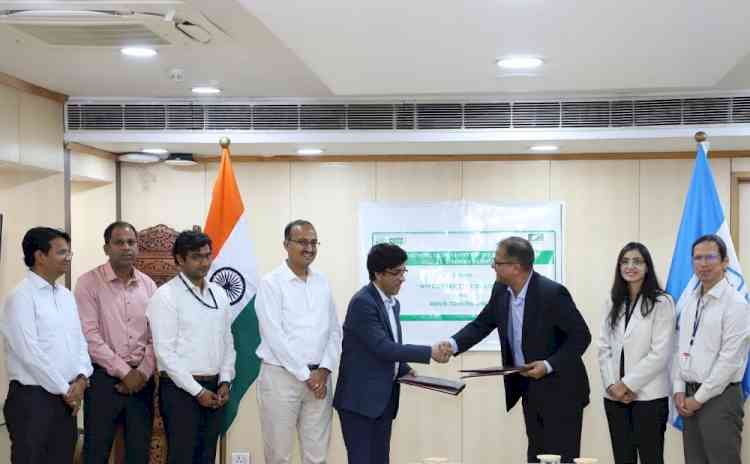Change in Dietary Habits, Intake of Processed Foods Spurring Cancer Incidence in India
Author(s): City Air NewsKolkata: Rapid changes in dietary habits, increased consumption of packaged foods, high levels of industrial and environmental pollution and the inadvertent entry of chemicals in the human food chain are factors...


Kolkata: Rapid changes in dietary habits, increased consumption of packaged foods, high levels of industrial and environmental pollution and the inadvertent entry of chemicals in the human food chain are factors that are spurring an alarming rise in cancer incidence in India.
Dr Tanmoy Mukhopadhyay, Senior Consultant Clinical Oncologist, Apollo Gleneagles Cancer Hospital, Kolkata says not only has the numbers of several cancers increased in recent years, but in an alarming trend the average age of incidence has also reduced drastically in recent years. On an average, nearly 12 lakh new cancer cases get added annually to the 25 lakh existing patients across the country.
“The downward shift in the average age of cancer incidence is also a very disturbing trend. Earlier, the risk of cancer was believed to increase with age. What was earlier considered a disease primarily of the old in now increasing afflicting young men and women, even in their 30s and 40s. The common factors that are responsible for the rise in increase of cancer incidences are lifestyle, food habits, chemical usage such of pesticides, insecticides, fertilizers, preservatives and likewise,” says Dr Mukhopadhyay.
“Change in dietary habits from traditional to western, increasing intake of processed/ preserved/packaged foodsand decreasing consumption of raw vegetables and fruits are factors that are being recognized as probable risk factors. Another hazardous factor is dangerous industrial and environmental toxicants that are rampant in our air and water bodies and find their way into our fruits and vegetables. Excessive use of pesticides also pollutes fruits and vegetables, as does the use of chemicals that is used for artificial ripening of the fruits and vegetables,” adds Dr Mukhopadhyay, explaining the probable causes for rising incidence of cancers.
Consumption of packaged foods has been a regular practice of lifestyles in the west where incidence of colorectal cancers has traditionally been high. Increasing urbanization and convenience is prompting more and more Indians today to adopt western lifestyles. Eating lots of red or processed meat increases the risk of bowel cancer, stomach and pancreatic cancers. Another reason for the rise in cancer incidence is the high consumption of alcohol, smoking and tobacco.
“Lack of awareness is one of the leading challenges faced by India in fighting cancer. A majority of diagnoses in India happen in advanced stages (stages 3 or 4) unlike the West where regular screenings have ensured that most cases are diagnosed in early stages and treated. Delay in diagnosis often means that a treatable disease becomes untreatable. Many people, especially in rural areas, tend to see local medical practitioners who might lack sufficient knowledge of the disease,” says Dr. Mukhopadhyay.
According to the World Cancer Report 2014, commissioned by the International Agency for Research on Cancer (IARC), WHO’s research body, cancers figure among the leading causes of mortality worldwide, with approximately 14 million new cases and 8.2 million cancer related deaths in 2012. While the 5 most common cancers among men in 2012 were lung, prostate, colorectum, stomach, and liver cancer; among women the 5 most common sites diagnosed were breast, colorectum, lung, cervix, and stomach cancer. A study has revealed that in 2007 Kolkata had topped the metros in new lung cancer cases.
“Indian cities and urban centres have witnessed major lifestyle and behavioral shifts including greater independence of women and their increased participation in professional fields. This has helped delay marriages, pregnancies, reduced the number of pregnancies as well as duration of breast feeding while increasing consumption of oral contraceptives. At the same time, a turn towards sedentary lifestyles, increased obesity, smoking and drinking are all factors that contribute to increasing risk of breast cancer among women,” says Dr Mukhopadhyay. It is estimated that by 2030 the number of new cases of breast cancer in India will reach just under 2,00,000 per year.
What is scary is the estimate that cases are expected to rise by about 70% over the next 2 decades, something that calls for urgent attention on prevention and lifestyle modification. It is predicted that by the end of 2020, over 10 million people would die globally each year because of cancers with 70% deaths from the developing countries only. WHO believes that around one third of cancer deaths are due to the 5 leading behavioral and dietary risks which are High body mass index; Low fruit and vegetable intake; Lack of physical activity; Tobacco consumption; Alcohol intake.
A sedentary lifestyle that includes lack of exercise, eating junk foods, inadvertent use of chemicals in foods can increase the risk of cancer. Keeping a healthy body weight can help reduce the risk of bowel, breast (postmenopausal), kidney, womb, esophageal, pancreatic and gall bladder cancers. Therefore, adopting such as regular exercise, eating food on time, intake of nutritious food, quitting habits like smoking and alcohol can help in preventing cancer.
Date:
Friday, February 5, 2016

 cityairnews
cityairnews 















